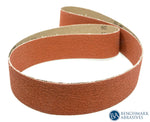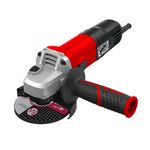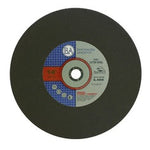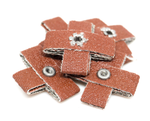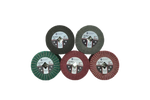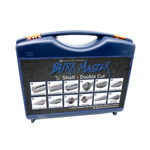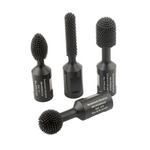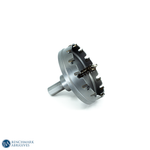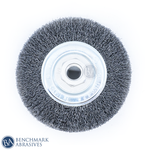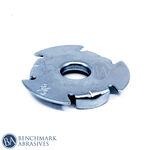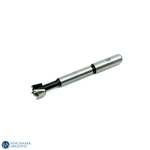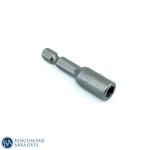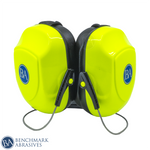
Which Drill Bits to Use: HSS, Cobalt, or Carbide

Selecting drill bits is difficult when it comes to drilling. Drill bits come in various shapes and sizes, as well as different coating materials and compositions, for various uses. This article discusses the differences between high-speed steel (HSS), cobalt drill bits, and carbide drill bits.
High-Speed Steel Or HSS Drill bits
Drill bits made of high-speed steel (HSS) are durable and resistant to heat. Due to the high concentrations of chromium and nickel in stainless steel, HSS bits are extremely robust and durable. They can be used to drill metal, PVC, plastic, and hardwood with firmness. If properly maintained, they provide long-term performance and are safe to run at high speeds (RPM).
Over time, HSS drill bits may get dull and need to be sharpened, which requires specialist equipment that isn't always available. Additionally, if you're drilling with the HSS drill bit for extended periods of time or at high RPMs, cutting fluid may be required to keep it cool.
Advantages of HSS Drill Bits
- Heat Resistance: HSS drill bits have exceptional heat resistance, which allows them to cut even at high speeds. Their effective heat-dissipation prolongs tool life and helps avoid overheating.
- Affordable: HSS drill bits are substantially less expensive than carbide drill bits, making them a prudent financial choice for general-purpose drilling activities. Their exceptional tool life and resharpening capacity make them even more commercially beneficial.
- Flexible: Due to their degree of flexibility, HSS bits are less prone to break or chip, particularly when drilling into random objects.
- Several options: HSS bits can be used with a wide range of materials, such as wood, plastic, aluminum, mild steel, stainless steel, and cast iron. Due to their adaptability, they are a reliable option for a variety of drilling applications across numerous sectors.
Disadvantages of HSS Drill Bits
- Restricted lifespan: Carbide drill bits outlast HSS bits despite the latter's exceptional durability for their price range. They typically deteriorate more quickly, especially when drilling through abrasive materials or performing heavy-duty tasks. Regular replacements or resharpening may be necessary after prolonged use.
- Not for delicate tasks: Because of their wider drill bits, HSS bits are not as well suited for precision drilling tasks as carbide drills. Since accuracy and precision are essential when drilling intricate or tiny holes, carbide drill bits are the best choice.
- Regular sharpening of HSS drill bits necessitates time and specialized equipment.
- Limited Speed: HSS drill bits work more slowly than other drill bits when cutting through hard materials. In some cases, slower drilling can lead to less durable and effective equipment.
Cobalt Drill Bits
Steel (or another alloy) is combined with a tiny quantity of cobalt, usually between 5 and 7 percent, to make cobalt bits. With a melting point of 1495°C and a boiling point of 2927°C, cobalt is ideal for high-temperature applications.
Cobalt drill bits are extremely durable. They can drill at substantially faster speeds than a traditional HSS drill bit. Because of their heat resistance, cobalt bits can work for long periods without bothering to cool or use cutting fluid. They're commonly utilized to cut through tough or abrasive materials. Cobalt bits can be used to cut a variety of metals, including titanium, stainless steel, cast iron, and bronze.
The cutting edge of a good cobalt bit should be longer than that of a typical HSS bit. Like other HSS components, cobalt is resistant to corrosion so it will maintain its shape under any storage or usage conditions. Conversely, cobalt might be brittle. Cobalt drill bits can be expensive to replace if they break due to improper maintenance or dropping.
Advantages of Cobalt Drill Bits
- High Heat Resistance: The capacity of cobalt to tolerate high temperatures is well known. It may disintegrate at temperatures higher than 2,700 degrees Fahrenheit. Heat from friction can harm drill bits composed of different materials. This is not an issue because cobalt drill bits have a high melting point. High temperatures do not cause cobalt steel drill bits to fracture or deform.
- Durable: The cobalt alloy coating gives drill bits more strength and hardness, which ultimately lengthens their lives. Additionally, it keeps it sharper and less prone to damage.
- Smooth finish: Thanks to their cobalt metal coating, cobalt drill bits remove friction during drilling, offering a perfect finish.
Disadvantages of Cobalt Drill Bits
- Less accessible: Unlike HSS and carbide drill bits, cobalt drill bits, particularly those of smaller size or kind, are not as easily accessible.
- Expensive: Due to their scarcity, cobalt drill bits are very costly. Secondly, the extra cobalt plating makes it more expensive.
- Fragile: If not used correctly, cobalt drill bits may break or become brittle. Furthermore, excessive pressure can break the bit.
Carbide Drill Bits
In terms of longevity, heat dissipation, and edge retention, carbide drill bits outperform conventional drill bits. Like the cobalt drill bit, they are brittle and could be broken up if used incorrectly. Carbide-tipped bits are commonly used in stone and masonry drilling.
Advantages of Carbide Drill Bits
- Excellent Heat Resistance: Carbide drill bits can continue operating even in extremely hot or cold temperatures. Thus, they are ideal for high-speed drilling operations or lengthy, heat-producing drilling jobs.
- Adaptability: Carbide bits are incredibly versatile instruments because they effortlessly cut through a wide range of hard and soft material types, including aluminum, stainless steel, and toughened steel. Because carbide bits may be used for a variety of drilling tasks, they are more efficient overall because they eliminate the need to swap between drill bits constantly.
- Outstanding Hardness: The tungsten carbide alloy is used to make carbide drill bits. These drill bits are extremely hard because tungsten carbide is one of the hardest materials in the world. This makes it possible for them to drill through challenging materials, such as ceramics and cast iron.
- Durability: Because carbide drill bits can penetrate hard materials, they are long-lasting.
- Appropriate for precise work: Carbide drill bits are very efficient for precise drilling. Thanks to their powerful and sharp cutting blades, errors and odd forms are less likely, and holes are cleaner and more accurate.
Disadvantages of Carbide Drill Bits
- Brittle Nature: Despite their exceptional durability, carbide drill bits can occasionally become brittle. Misuse, extreme pressure, or accidental drops can cause chipping or breakage. However, such issues can be prevented by employing the proper drilling techniques and exercising caution when using carbide drills.
- Expensive: One of the carbide drill bits' main disadvantages is that they are more costly than other drills. Both the production method and the combination of rare components contribute to their higher price tag. Nonetheless, carbide bits are a wise long-term investment due to their exceptional performance and longevity.
HSS Vs. Cobalt Vs. Carbide Drill Bits: Comparison
|
|
HSS Bits |
Cobalt Bits |
Carbide Bits |
|
Made Of |
Carbon, tungsten, chromium, and cobalt with iron as a base material |
Steel alloy with 5-8% cobalt |
Tungsten carbide |
|
Used For |
Soft materials like wood, plastic, some metals, steel, brass |
Hardened materials and abrasives, including titanium, cast iron, bronze, and stainless steel |
Hardest materials like concrete, stone, and masonry |
|
Resharpen |
Yes |
Yes |
Yes |
|
Durability |
No |
Yes |
Yes |
|
Price |
Inexpensive |
Cheaper than carbide, expensive than HSS |
Expensive |
|
Heat Resistance |
Low |
Not as much as carbide drill bits, but more than HSS |
High resistance more than cobalt and HSS drill bits |
Conclusion
Carbide drill bits are the toughest and most costly of the three. They're only suitable for expert use. Cobalt drill bits are also used to drill tough and long-lasting materials. HSS is ideal for drilling soft and hard materials.
Drill bit selection is critical. When choosing drill bits, keep the parameters and requirements of your job in mind.

